Research co-production with ReCoCo to understand community-based support for wellbeing
We talked with the Well Citizen Challenge Area team about their project with the Recovery College Collective (ReCoCo), developing understanding of peer support and lived experience of mental health through visual-based and co-creation research.
Tell us a bit about the project with ReCoCo, give a brief summary.
As a result of the pandemic, there is a significant increase in mental health support for NHS services, and the public sector is increasingly turning towards voluntary organisations to support care provision. The CDC team working on the Well Citizen Challenge Area has been inspired by early conversations with partners to investigate the challenges faced by the voluntary sector to deliver community-based support for mental health.
Since last October, we have been working closely with the Recovery College Collective (ReCoCo) and co-developed a programme of research for conducting scoping work to understand service design and delivery as part of the bigger picture of integrated care systems and social prescribing. We wanted to understand: What does a place-based or community-led approach look like for supporting people with their mental health and broader wellbeing? A related aim was to capture service users’ experiences and how they attribute value to aspects of the service and approach.
So far, we have conducted fieldwork, workshops, and – with our colleague Daniel Parry – short interviews (‘Vox Pops’) to engage both service users and staff members at ReCoCo. In this blog post, we share more about the Vox Pops work and reflect on its early impact for the organisation. Note that we refer to service users attending the college as ‘students’.
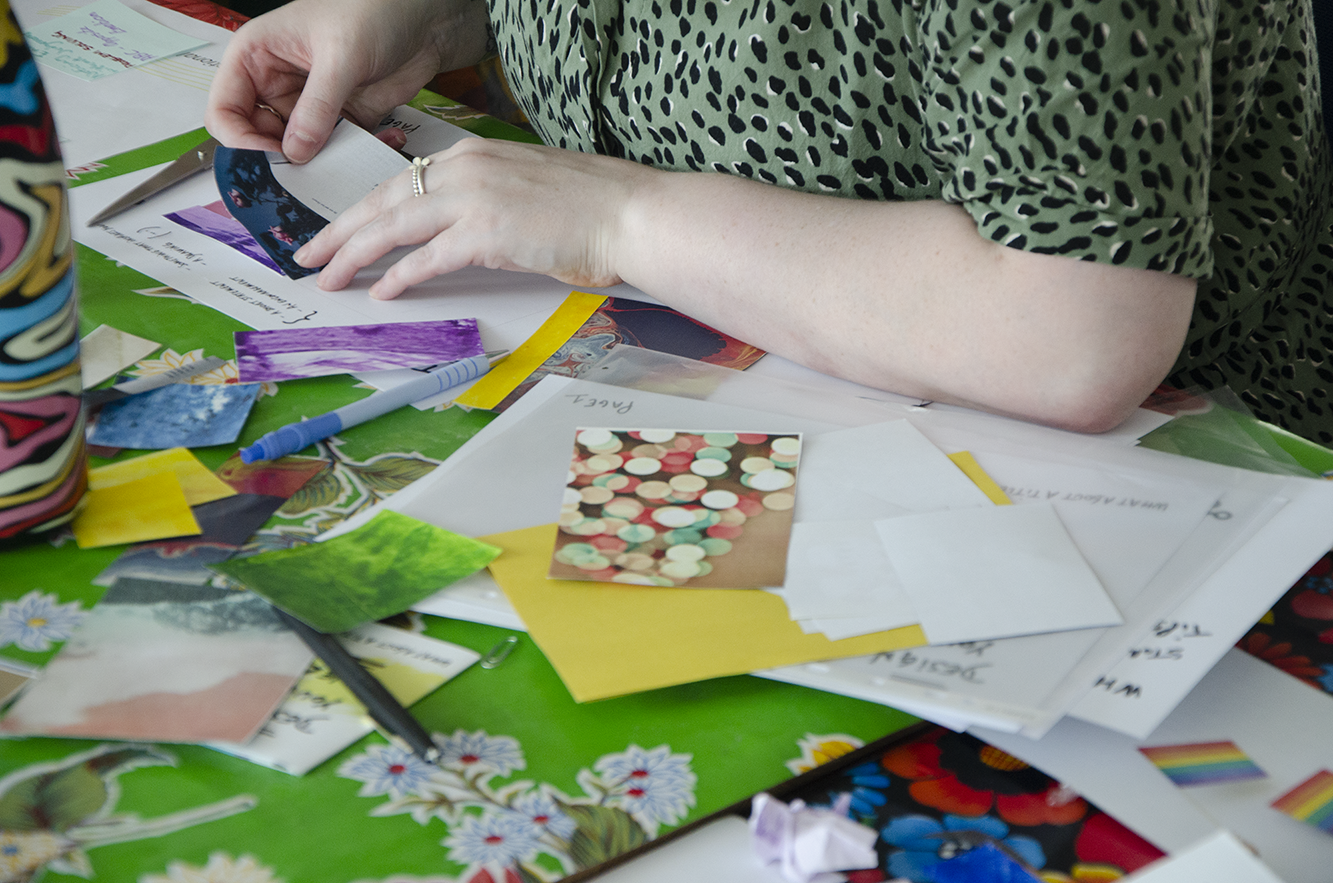
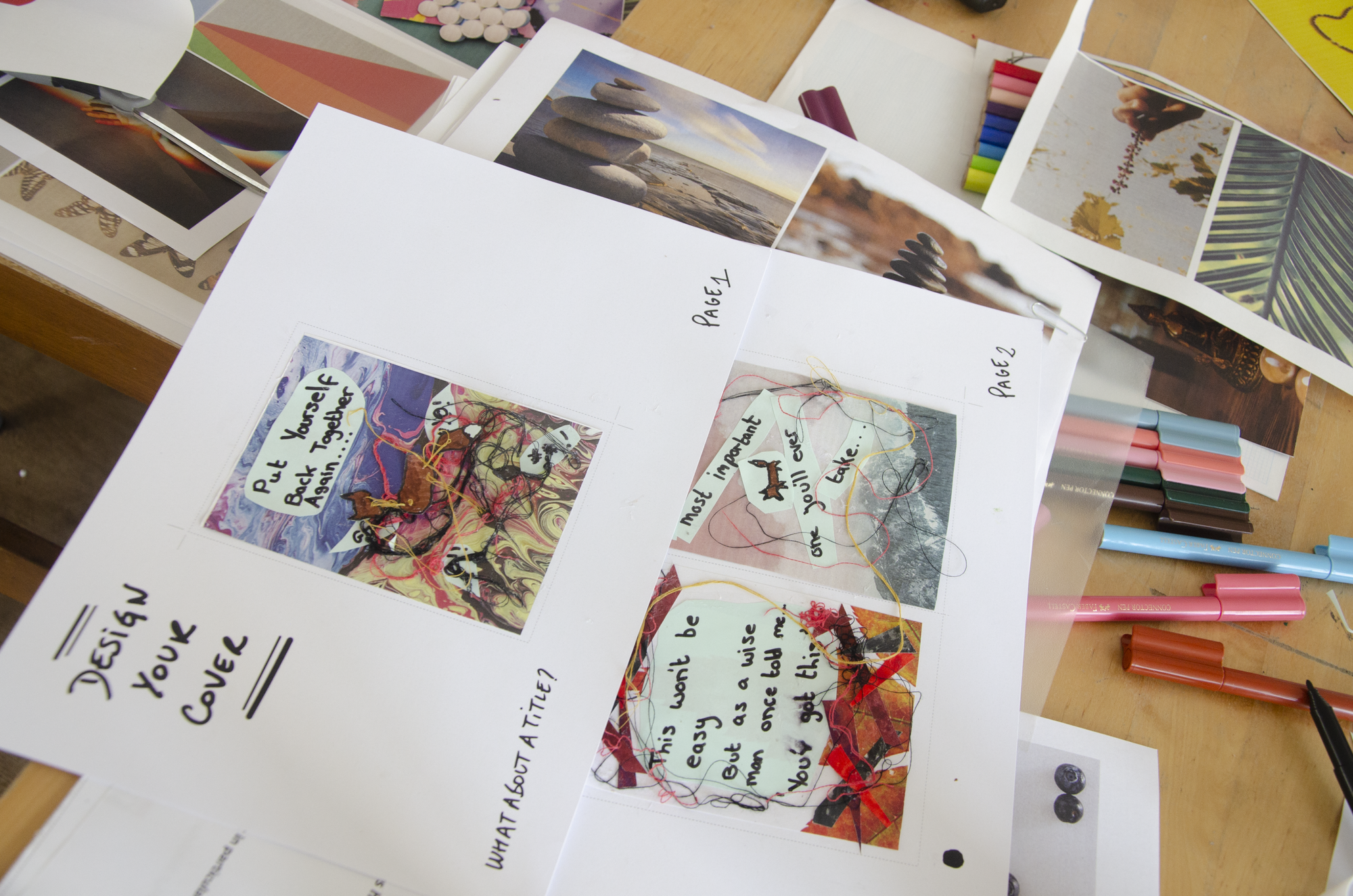
How did the idea of creating a film and Vox Pops come about?
Visual methods, including methods that utilise Film and Video media, can be used powerfully in research in the fields of Design and Human Computer Interaction (HCI), for capturing rich descriptions of place and experience. As design researchers we had used Film before in our work and through conversations with ReCoCo, we found out that they used what they called a Vox Pops method previously, to capture service users’ feedback. Vox Pops have been widely used in the public media communication to spontaneously capture people’s ideas and opinions on various topics. We adopted this method and set up a cosy corner at ReCoCo’s premises, and invited their students to come and sit with us, and share about their personal experiences at the college.
Ethics was carefully developed designing this video-based study in collaboration with ReCoCo. It was explained to the students, as potential study participants, that they would be fully informed about what the research is for, and how the Vox Pops recordings may be edited and used, so that they would be able to give their consent to use their contributions when needed.
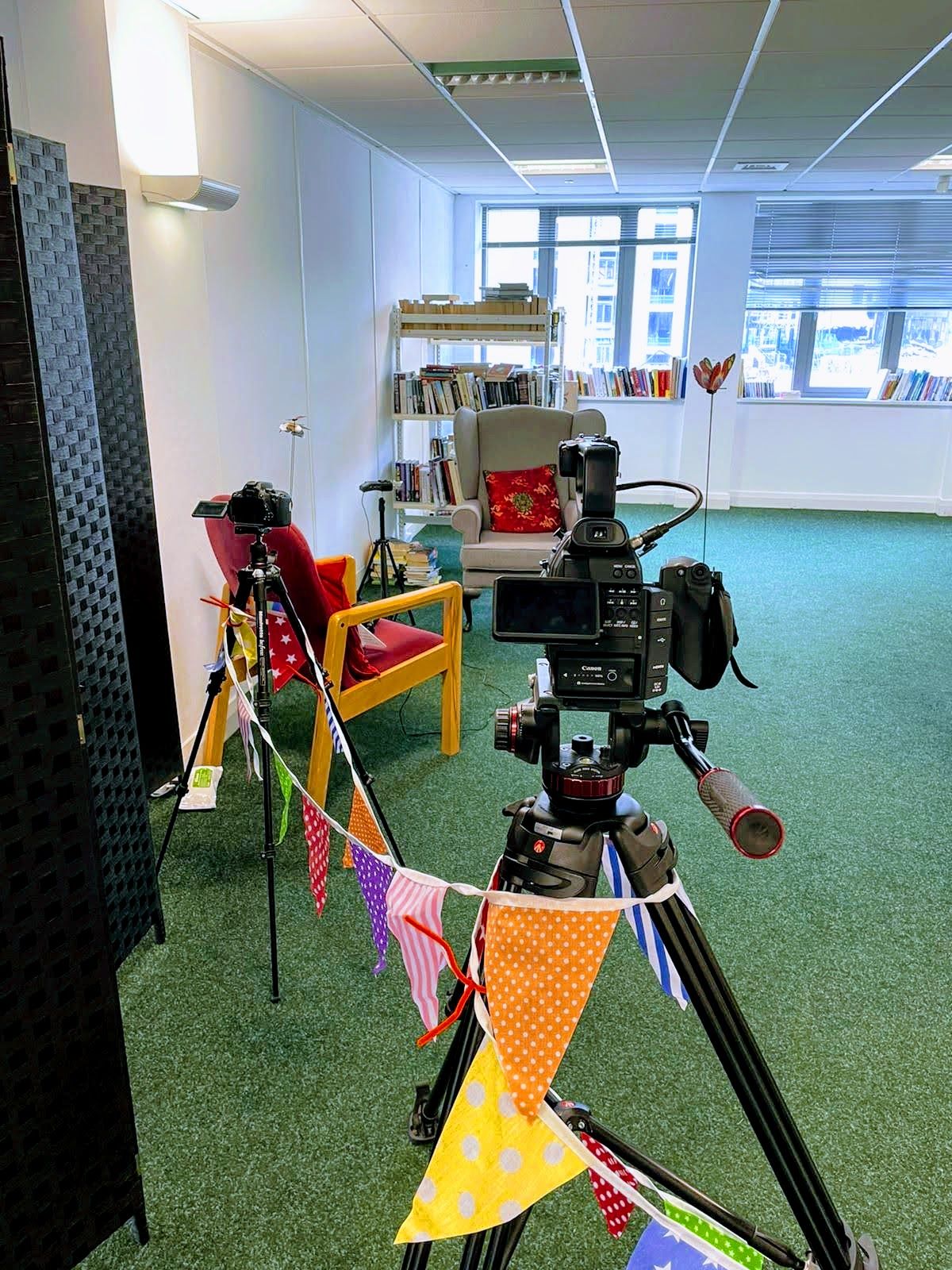

Did ReCoCo have experience of working with researchers before? What do you think they got out of the experience?
Discussion with our partner, ReCoCo, emphasised their critical need to collect data about the use of their services, and use over time, to evidence the impact of what they do:
What we collect is so valuable. It demonstrates what really works for people; real relationships, a sense of belonging, increased understanding and the opportunity to explore their own sense of purpose (Co-Director Angela Glascott).
When planning the study, we identified with ReCoCo the potential value that research initiatives like the CDC programme could have for supporting them capture, explore and use data in a meaningful way. Co-Director Angela reflected that, in the past, the ReCoCo team have had opportunities to work with researchers, but that they haven’t had the capacity to fully utilise research outputs.
The CDC has provided us with the resources and capacity to co-develop the research aims and method together, and to develop trusted relationships and common ground within the working partnership. By doing what we called ‘scoping work’, we could explore and evidence unmet needs and challenges, providing the evidence and impetus to plan further, longer-term studies. Early on in the project, Innovation Fellow Caro Claisse became a volunteer at ReCoCo, gaining first-hand experience of the college’s work and service offerings by visiting on a regular basis.
She was able to participate in various activities like drop-in sessions and courses, and she got to know the staff and students. After doing this for a number of months, her role shifted to become a researcher who is spending time at ReCoCo, to understand routine activities and experiences at the college. We formally call this Ethnography, and, in due course, it was supported by using the Vox Pops method to collect data from people.
What was it like for participants and staff to take part in the Vox Pops and attend the screening of the film?
Over two days, we had 20 students who participated in the Vox Pops. When students came in to ReCoCo, they were invited by the researchers to sit in a cosy corner where we had armchairs set up and had created a semi-private space with a screen.
After stepping through a consent form and agreeing to be filmed, each student introduced themselves and then responded to three open questions raised by researcher Caro: (i) why they came to the college on that day, (ii) to describe how it feels like to come to ReCoCo and (iii) to reflect back to us what they feel they get from attending the college so far.
What participants chose to share with us was really compelling, and listening to individuals’ experiences and stories felt moving. For example, they described peer support services like ReCoCo in terms of ‘unique’ and ‘lifesaving’. Most of them reflected how attending the college helped them slowly regain confidence and find self-worth, with ‘tools to survive’ for self-managing their mental health and wellbeing more broadly.
ReCoCo saved me, like, saved me from myself. There’s, there’s no other way to put it. They gave me the skills, the self-confidence, the self-belief, the hope to, erm, genuinely start believing that my life could get better, that it could be more than I thought it was (Research participant).
We shared video clips of the recorded Vox Pops with staff at ReCoCo to discuss next steps with the research. Watching students described the impact of ReCoCo on their lives had a profound impact on the staff members. Angela reflected back to us what it felt like to watch what students shared:
Emotional. I think when you’re in the midst of the operation you don’t often get the chance to hear what the real impact is, on the people who use us. It’s reassuring to know that the intuitive approach we’ve adopted is actually working and improving lives. It was good for the whole team to hear that. It validates what we do and confirms that its really worth all of the hard work.
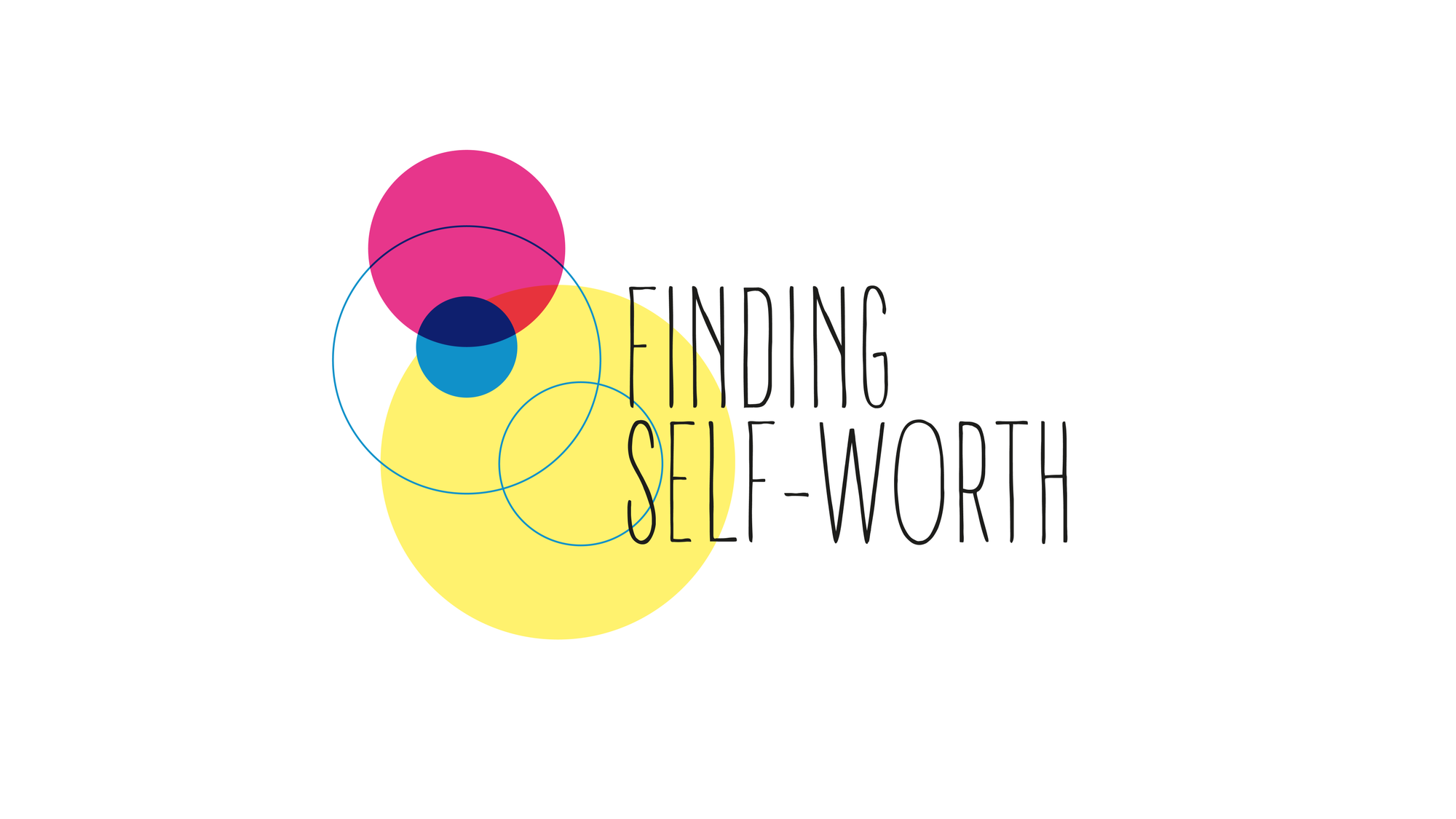
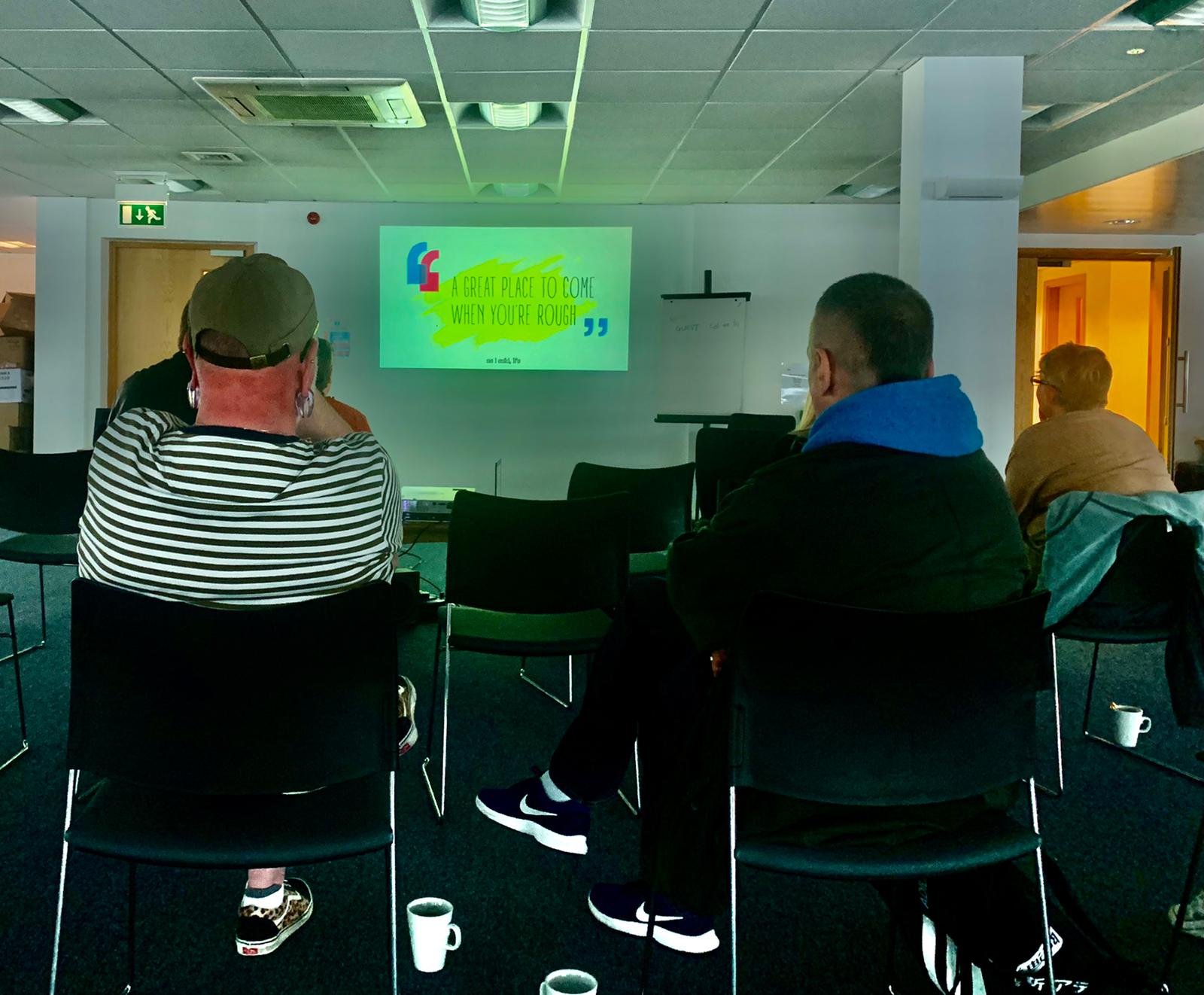
In the Summer, we organised a film screening event where we showed participants a 40-minute compilation of Vox Pops clips, which were edited to reflect topic themes. We used the screening session to further reflect on what had been communicated through this work and the medium of film. Overall, we got a really good response from participants who felt moved and proud to be part of the film:
Everybody has got a story to tell and it’s about being listened to and that’s what makes it moving I suppose… I think if somebody was to write a script of that, it would not be real. It would not have the same impact as people with lived experience opening up and telling their story, and that takes courage!... You can’t write that but you can show it (Vox Pops participant).
The screening informed a shorter edit of the film (15 minutes), which was projected during a ReCoCo Advisory Board meeting, which included representatives from the NHS. This provided an opportunity to introduce our work to a broad range of stakeholders, and use the film to communicate students’ experience of coming to ReCoCo.
ReCoCo also observed the value of this embedded approach supported by Vox Pops:
We have loved having you here and the videos you’ve made are so powerful and having the students articulate the impact themselves is brilliant. And we would always welcome interest from other researchers who might be interested in genuine person centred/strength-based approaches to mental health (Co-Director Angela).
How does this project feed into the wider Well Citizen Challenge Area?
This project connects to the Well Citizen Challenge Area theme: ‘Sustaining Community-Based Action on Health’. We were initially interested to explore how community-led initiatives have responded to the COVID-19 pandemic and how they have organised to continue provide mental health and social support during and beyond the pandemic.
By collaborating with ReCoCo, we have focused on investigating peer-led and peer-delivered support, and we have now a better understanding of what this looks like. We have also learned about the challenges faced by organisations like ReCoCo to continue supporting the local community in post-pandemic times. In a follow-up chat, Co-Director Angela highlighted the need to revolutionise the current healthcare system:
The old ways never really worked in the ‘before times’ and they’ve very quickly become unfit for purpose now that the cost of living crisis has become catastrophic for communities. The system needs revolutionised quickly and we believe we have a valid, effective alternative that any courageous decision makers or innovators could quickly adopt. […] What we do is simple. We bring people together and they heal each other through their understanding and compassion and Hope.
What are the future plans for working with ReCoCo?
We are currently writing up insights from this work whilst conducting further studies with ReCoCo to co-develop a longer-term programme of research together. Over the summer, ReCoCo also partnered with us on a regional research proposal that was informed by our collaboration and insights gathered to date.
We would like to thank our project partner, the staff at ReCoCo and all our participants.
Written by: Caro Claisse & Abigail Durrant with contributions from Angela Glascott (ReCoCo Co-Director).
The Well Citizen team who worked on this project included: Caro Claisse, Daniel Parry (Digital Content Creator), Muhammad Umair (Innovation Fellow) and Abigail Durrant (Well Citizen Challenge Area Lead at Newcastle University, Co-Director of CDC and Open Lab). Feedback on the research design was provided by Dawn Branley-Bell (Innovation Fellow, Northumbria University) and Lynne Coventry (CDC Co-Investigator, University of Abertay).